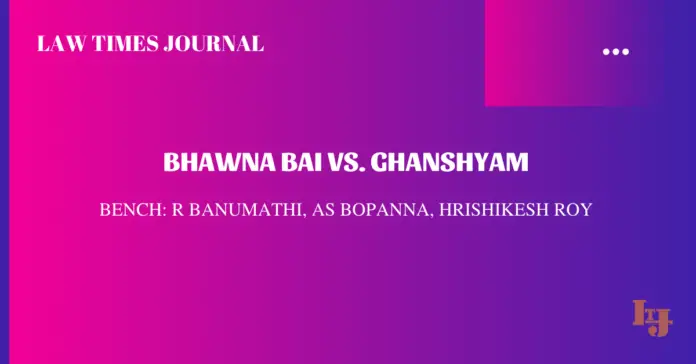
In the Supreme Court of India
Criminal Apellate Jurisdiction
Petitioner
Bhawna Bai
Respondent
Ghanshyam
Date of Judgement
3rd December 2019
Bench
R Banumathi, AS Bopanna, Hrishikesh Roy
Facts of the case:
The appeal arises out of the judgment and the final order passed by the High court of MP, at Indore bench in a criminal revision petition, by virtue of which the high court quashed the charges framed by the trial court against the respondents.
The brief facts of the case are as follows-
The respondents Ghanshyam and Bhagwan went with the deceased Gopal Saran for ploughing in the fields of Ghanshyam, the deceased was last seen with their company, and all three of them also consumed liquor. Both Ghanshyam and Bhagwan reached their home at night, but there was no information regarding Gopal, later he was found dead in Ghanshyam’s field, and the same wasn’t informed by Ghanshyam to other, when Gopal’s wife Bhawna tried to go to deceased body, she was stopped and confined in a room by Ghanshyam, son Ganesh, it was also shown that the respondents had earlier fight with the deceased, which showed a probable motive for the crime.
The trial court found that there are sufficient grounds for proceeding against the accused and as per section 228 of the CrPC[1], it framed charges against the respondents under section 302 read with section 34 of the IPC[2]. Challenging the decision of the trial court the respondents filed a revision before the high court, contending that while framing charges, the court should apply the judicial mind and should give reasons in concise manner for framing charges and that the trial court has failed to apply its mind while framing charges, the High Court vide impugned order quashed the charges against respondents and discharged them. Being aggrieved the appellant preferred an appeal before the apex court.
Relevant Provisions:
Section 228 CrPC, empowers a judge to frame charges against the accused, if considering the circumstances of the case, he is of the opinion that, sufficient grounds exist for proceeding against the accused.
Issues:
1. What standard of proof is required while framing the charges under section 228 CrPC?
2. Whether a detailed reasoning needs to be given while framing the charges under section 228 CrPC?
Arguments advanced:
Respondent’s Arguments:
The counsel for the respondents, contended that for the applicability of the section 228 of CrPC, Applicability of the judicial mind is required considering the facts and circumstances of the case, and a detailed reasoning is to be given for framing the charges under section 228 CrPC. Because of the absence of these factors while framing the charges by the trial court, the High Court is correct in its order for quashing the charges against the respondents.
Appellant’s Arguments:
The appellant contended that considering the circumstances like last seen together; recovery of dead body; not informing the family of the victim immediately upon discovery of dead body; not informing the police; recovery of other belongings of dead body including tractor and such other circumstances connecting the accused-respondents with the death of Gopal Saran and considering those circumstances, the learned Second Additional Sessions Judge satisfied himself that there are sufficient ground for framing charges against the accused.
The appellant also contended that when the trial judge has so satisfied that there are sufficient grounds for framing the charges against the accused, in exercise of its revisional jurisdiction, the High Court ought not to have interfered and quashed the charges framed by the trial court.
Judgement:
The court observed that, though the circumstances alleged in the charge sheet are to be established during the trial by adducing the evidence, the allegations in the charge sheet show a prima facie case against the respondents. The circumstances clearly indicated that there are sufficient grounds for proceedings against the accused.
The court took the support from the judgment in State of Bihar v. Ramesh Singh[3]and observed that, at the time of framing the charges, only prima facie case is to be seen; whether case is beyond reasonable doubt, is not to be seen at that stage. At the stage of framing the charge, the court has to see if there is sufficient ground for proceeding against the accused. While evaluating the materials, strict standard of proof is not required; only prima facie case against the accused is to be seen.
Referring to the judgment in Dinesh Tiwari v. State of Uttar Pradesh[4], the Supreme Court held that for framing charge under Section 228 CrPC., the judge is not required to record detailed reasons as to why such charge is framed. Considering the facts and circumstances of the case , if the judge is of the opinion that there is sufficient ground for presuming that the accused has committed the offence triable by the Court of Session, he shall frame the charge against the accused for such offence.
The court held that the trial court considering the facts and circumstances of the case was of the view that the charges needed to be framed against the respondent under section 302 read with section 34 of IPC, and the High Court erred in quashing such charges, and hence set aside the order of the High Court.
Ratio Decidendi:
1. While framing the charges under section 228 CrPC, the court has to see if their are sufficient grounds for proceeding against the accused, and a strict standard of proof isn’t required at the time of framing charges.
2. While framing the charges under section 228 CrPC detailed reason need not be recorded.
Edited by Sree Ramya
Approved & Published – Sakshi Raje
Reference
[1]The Code of Criminal Procedure 1973.
[2]The Indian Penal Code 1860.
[3]State of Bihar v. Ramesh Singh(1977) 4 SCC 39.
[4] Dinesh Tiwari v. State of Uttar Pradesh(2014) 13SCC 137.








